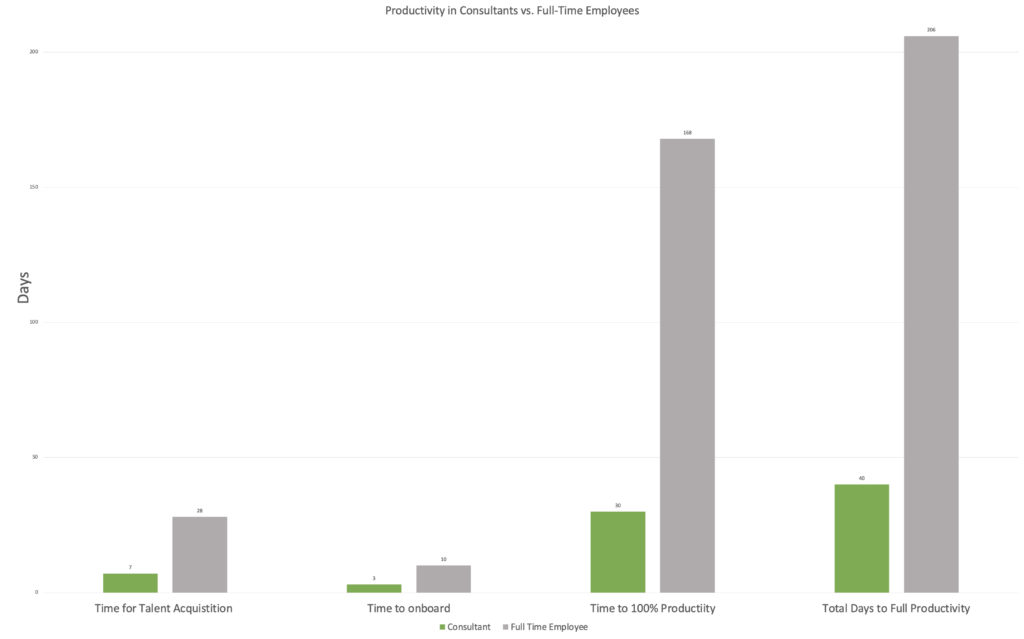Surprising Productivity and Cost Advantages to Hiring a Consultant Over an FTE
Leave a CommentIf you’ve struggled to find the right candidate or retain people central to your operations, you’re not alone. According to a recent Microsoft report, nearly 41% of the global workforce is contemplating quitting their jobs. The term for this change is the “Great Resignation.” This massive transition means that keeping existing projects alive – and embarking on new projects – may require a shift in how you think about full-time employees vs. consultants.
Previously, the metric for making this decision might have been merely, “Which one is cheaper?” Now, with longer times to acquire talent and a more difficult path to retain that talent, the concept of affordability becomes outdated. It doesn’t take into account how long a person has to be in their job before you receive the maximum benefit from them. It also doesn’t account for the emerging trend of a person leaving their job soon after being hired.
Additionally, the cost metric is usually based on an annualized view of a team member. If the job role is a short-term need (for example, to help your company get past a project goal post) you may not need that team member after the work is completed. For project-based needs, we need to look at the time-to-full-productivity as a better measure of when you can expect to achieve a return on your investment.
How to Determine the Time-to-Maximum-Productivity
When determining how long it will take for you to see maximum productivity from your new team member, we look at specific metrics:
- What is the time to acquire talent?
Currently the time for acquiring consultant talent is about 7 days. Compare this with a full-time employee (FTE), which can take at least 28 days. - How long does it take to on-board talent?
Because consultants are not signing up for all the various programs a company has to offer and they don’t need to be integrated into all of the company’s systems, the time-to-on-board averages three days.An FTE typically takes about 10 days to onboard, because they need to be brought up to speed on all company policies and be added into the company’s systems and infrastructure. They may also need to take crucial training courses, because they will be lasting beyond the project and will need to be able to handle different kinds of work.
How long for the team member to achieve 100% productivity?
A consultant is an experienced candidate hired to deliver on a specific project. Because of the vetting process, the person will be matched with the project at hand based on their experiences, skill set, and ability to perform the required work quickly and correctly. The time to full productivity is much shorter than for an FTE.
Unlike a consultant, an FTE may have additional responsibilities and meetings as they are more fully integrated into the company. There is an emphasis on developing lasting relationships with other employees and team-building. This process elongates the time to full productivity.

As illustrated in the graph above, acquisition, onboarding, and time-to-maximum productivity takes approximately 40 days for consultants and 206 days for a typical FTE. In other words, a consultant will be fully productive five times faster than an FTE. It can be easy to overlook the
SG&A (Sales, General & Administrative Expenses), fringe benefits, overhead, and talent acquisition costs, which can give an inaccurate view of the true costs of an FTE.
Putting This in Financial Terms
To understand the financial impact of reaching full productivity, assume a base consultant cost of $125/hr. With the additional SG&A associated with that consultant, that number becomes $156.25 per hour. On the other hand, an FTE earning a salary of $135,000 would have an hourly rate (SG&A, overhead, fringe benefits, & talent Acquisition Costs) resulting in an hourly rate of $189.84. To calculate out the expense to full productivity, for a consultant the cost would be $6,250 vs $39,107 for an FTE.
Perhaps even more important than the financial impact is the time savings. Because a consultant can be fully productive in 40 days versus 206, a consultant saves you 166 days – or about 5 ½ months – of time. Imagine delivering a project 5 ½ months earlier and at cost savings relative to the time investment. Conversely, imagine having to wait an additional 5 ½ months to deliver on a stalled project.
How Do I Know If a Consultant Approach Might Be an Option for My Company?
To assess if a consultant approach might be a good fit for your company, it’s helpful to understand some key elements:
- Are you trying to reach a deadline quickly? If so, consultants will save you time and cost.
- Is this an ongoing need within the company or is this role needed after the project completes? For ongoing needs or job roles that will be needed after project completion, a full-time employee might be a better option.
- Do you need to get some projects completed while you continue your search for the right full-time employee? Consultants are the solution.
Let Project Deliverables Drive Team Building Decisions
In a marketplace filled with challenges to find the right talent, it’s important to look at different ways to get projects completed. When a top priority is driving goal posts on a project or where the needed skill sets are unique to the market, consultants can deliver a good return on your investment and help your business stay on track.


